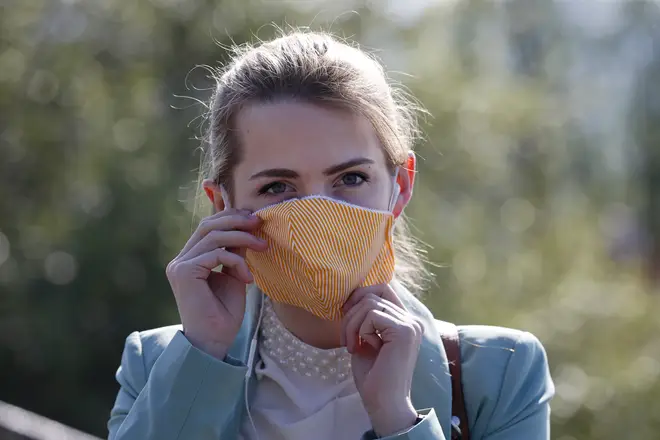
Matthew Wright 7am - 10am
9 April 2020, 16:26

People should be wearing face masks to protect against coronavirus, experts said today - in contrast to government guidance that states they aren’t required.
Researchers from the University of Oxford and the London School of Economics, said masks may help slow transmission of the virus, saying the public has little to lose from wearing them and plenty to gain.
The government said yesterday there were no plans to change the current guidance on masks, adding they were not necessary for use by the general public when out and about.
The World Health Organisation (WHO) also does not recommend them for widespread use and has raised concerns there could be a shortage of masks for medical workers if they are bought up by the general public.
READ MORE: latest coronavirus updates LIVE
Earlier this week, a team from the University of East Anglia (UEA) concluded there was no strong evidence to recommend them.
But a new study published by the British Medical Journal (BMJ), said an absence of evidence to support their use "is not evidence of absence."
They also said people in a deadly pandemic such as Covid-19 could be highly motivated to use them correctly if taught, quashing arguments that people fail to use them in the right way.
Furthermore, the argument that people should not wear masks because it may deplete stocks, is an argument for making more masks and "not for denying them to populations that might benefit from them,” the study says.
The experts pointed to "substantial indirect evidence" that the public could benefit from wearing masks, including the fact Covid-19 stays in the air for several hours and people can be asymptomatic for days before showing signs of illness.
"Masks are simple, cheap and potentially effective," they added.
"We believe that, worn both in the home (particularly by the person showing symptoms) and also outside the home in situations where meeting others is likely (for example, shopping, public transport), they could have a substantial impact on transmission with a relatively small impact on social and economic life."
In a linked editorial, Babak Javid at Tsinghua University in Beijing and colleagues agree that the public should wear face masks because the benefits are plausible and harms unlikely.
Earlier this week, the UEA team said there was no strong evidence to support the general public wearing face masks, although they may offer some protection for the vulnerable or those living with somebody who is ill.
They carried out a rapid review of existing scientific evidence and concluded there was no push to change current UK policy.
The study, which has not yet been peer-reviewed, found that widespread use of face masks was not needed.
But experts did find that if both an ill person and those who are well - and who live in the same household - wear masks, the risk of transmission is cut by 19%.
There was also enough evidence to support vulnerable people deciding to use masks for short periods, such as when they are on public transport, visiting shops or using the GP surgery.
Listen & subscribe: Global Player | Apple Podcasts | Google Podcasts | Spotify
Lead researcher Dr Julii Brainard, also from UEA's Norwich Medical School, said of the 31 studies reviewed: "We found that using a face mask and other face coverings had a consistent but small protective effect against influenza-type symptoms while people are out and about in the community.
"People who wore masks, usually surgical grade, were less likely to get respiratory symptoms from casual exposure in the community.
"Something like a sneeze or cough near you would become less likely to cause infection.
"It's a small reduction in risk, but might be very important to especially vulnerable people."